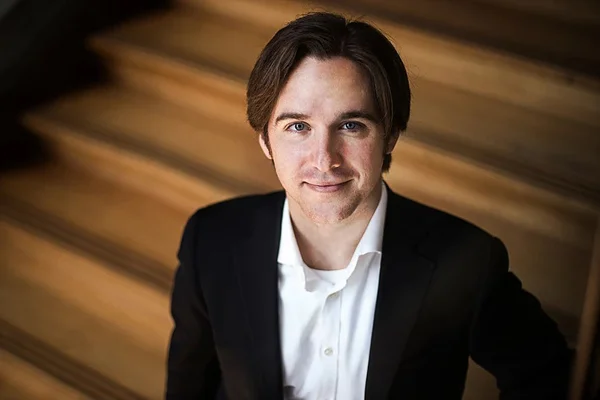The theatrical charm of English music is on full display! From the beauty of Purcell and Holst’s music for string quartet to the humorous wit of Britten’s cello sonata, this concert will move your soul and make you laugh.
Actress Olivia Custodio— a favorite of Salt Lake City theater fans— brings life and humor to Edith Sitwell’s comical poetry in Walton’s Façade. Shakespeare even makes an appearance in a series of instrumental scenes from Thomas Adès’ wildly successful operatic adaptation of The Tempest.
Other featured artists include cellist Rainer Eudeikis, pianist Jason Hardink, and Utah Symphony Associate Conductor Conner Gray Covington.
Rainer Eudeikis (Principal Cello, Utah Symphony) and Jason Hardink (Principal Piano, Utah Symphony) rehearse Benjamin Britten's Sonata for Cello and Piano.
Imogen Holst: Phantasy Quartet
Henry Purcell: Chacony in G minor
Thomas Adès: Court Studies from The Tempest
Benjamin Britten: Cello Sonata, op. 65
William Walton: Façade (text by Edith Sitwell)
Get More Out of Your Experience
Join us before each concert at 2:30pm to participate in a discussion about the music with Jeff Counts, Vice President of Operations & General Manager of the Utah Symphony. This is a great opportunity to learn more about the program and increase your enjoyment of the music you'll hear.
Program Notes
by Jeff Counts
No important thing should ever be solely defined by its stereotypes. Just as classic Russian literature is not only an agonizing study of life’s deepest philosophical difficulties, British art music is not simply rote Pastoralism made manifest in sound. This is not to say that, in the latter case at least, the stereotype hasn’t been well groomed over the last 100 years. British composers, like their counterparts throughout Europe at the turn of the last century, were anxious to find a Nationalist voice for their work, and this often led to idyllic depictions of their landscape and rural life. As a “sound”, British Pastoralism is highly distinctive and attractive, but it hardly captures the full scope of the Empire or her musical ambassadors. There is incredible variety to be found farther afield.
Before we depart those green meadows and simpler times, however, we should linger a moment with a prime example of the genre. The Phantasy Quartet of Imogen Holst won the Cobbett Prize in 1928 and exemplified the poetic intent of her early work. She was only 20 years old when she wrote it, but the maturity and stylishness of the music got the attention of her nation, especially those enamored of Vaughan Williams and his cohort. Too bad so little of Imogen Holst’s impressive catalogue exists in published form today.
Henry Purcell got a job with the royal court of Charles II in 1677. Sadly, much of the music he wrote for the King’s “Twenty-Four Violins” ensemble has been lost to time. Among the few remaining pieces that can reasonably be associated with Purcell’s time in Charles’ court is the Chacony in G minor. A chacony (or chaconne) is a set of baroque dance variations over a repeated bass line and, though it was already an established form at the time, Purcell showed a great deal of creativity and virtuosity with his interpretation of the standard ingredients.
Thomas Adès and Meredith Oakes premiered their contemporary take on Shakespeare’s The Tempest in 2004. In no genre have British composers thrown off the Pastoral yoke as much as opera. Adès, much like Britten before him, continues to nurture a modern national legacy that rivals the Italian tradition of the 19th century. The Court Studies were drawn from the original score in 2005 for performance at the Aldeburgh Festival and, according to Adès himself, depict a sequence of interactions between the characters Antonio and Sebastian.
The aforementioned Benjamin Britten has never been anything but himself. In fact, apart from language and subject matter, it might be hard to identify him as British at all. Disinclined towards patriotic nostalgia, Britten’s influences came from abroad and from the ragged edge of innovation. The Cello Sonata of 1961 (which also premiered at the Aldeburgh Festival) was written for Mstislav Rostropovich after the two met following the English premiere of Shostakovich’s First Concerto. It was the first of many collaborations between them.
The truth about the contrasts that have always been available in British chamber music is perhaps best told by noting that the fabulously strange work that ends this program was written and premiered 6 years before the Phantasy Quartet that begins it. William Walton set Edith Sitwell’s ‘nonsense’ poetry to music in 1922, and the resulting Façade certainly must still be one of history’s most perfect marriages of note and word. Irreverent and poignant, the sheer intellect on display in this collaboration is staggering and often hilarious to witness. It is worth noting that, in the early days, no two performances of Façade were ever alike, as the various movements came in and went out with no apparent reason or explanation.
featuring
About the Music
Phantasy Quartet
Imogen Holst (1907-1984)
composed 1928.
string quartet
Chacony in G minor, Z. 730
Henry Purcell (1659-1695)
first published 1680.
string quartet
Court Studies from The Tempest
Thomas Adès (b. 1971)
composed 2003/2005. first performance: 16 June 2006, Jubilee Hall, Aldeburgh, England.
clarinet, violin, cello, piano
I. The False Duke
II. The Prince
III. The King
IV. The False Duke’s Defeat
V. The Counselor
VI. The King’s Grief
Cello Sonata, op. 65
Benjamin Britten (1913-1976)
composed 1961. first performance: July 1961, Aldeburgh, England. Mstislav Rostropovich, cello. Benjamin Britten, piano.
cello, piano
I. Dialogo
II. Scherzo-Pizzicato
III. Elegia
IV. Marcia
V. Moto perpetuo
Façade
William Walton (1902-1983) and Edith Sitwell (1887-1964)
composed 1921. first public performance: 12 June 1923, Aeolian Hall, London. Edith Sitwell, narrator. William Walton, conductor.
flute/piccolo, clarinet/bass clarinet, alto saxophone, trumpet, percussion, cello
I. Fanfare
II. Hornpipe
III. Through Gilded Trellises
IV. Tango-Pasodoble
V. Lullaby for Jumbo
VI. Black Mrs. Behemoth
VII. Tarantella
VIII. The Man from a Far Countree
IX. By the Lake
X. Country Dance
XI. Polka
XII. Four in the Morning
XIII. Something lies beyond the Scene
XIV. Valse
XV. Jodelling Song
XVI. Scotch Rhapsody
XVII. Lily O’Grady
XVIII. Old Sir Faulk
XIX. When Sir Beelzebub







